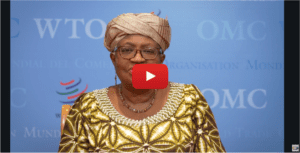In advance of the 13th WTO Ministerial, the WITA Academy hosted its first World Trade Organization Virtual Intensive Trade Seminar. The curriculum was designed to provide a basic understanding of the organization and key work streams of the WTO. The two-day Seminar started with welcoming remarks by the Director-General of the World Trade Organization, Dr. Ngozi Okonjo-Iweala. Click the video above to watch her remarks.
This event was free to attend for embassy, ministry, and government officials from around the world thanks to the support of the WITA Academy sponsors: UPS, the Cristena Bach Yeutter Charitable Trust, Mayer Brown, and the American Apparel & Footwear Association.
In total, 432 people from 58 different countries registered for the seminar. Among them were 400 government officials from around the world, including officials from 19 different U.S. government agencies.
If you are a government official and you wish to watch the recordings of the Intensive Trade Seminar, please email us at events@wita.org to get access free of charge. Non-government individuals are able to purchase access to the recordings by contacting us at events@wita.org.
|
Globalization in 2024: The Clouds are ClearingThe following is an excerpt from an article titled “Globalization in 2024: The Clouds are Clearing” by the Institute for Management Development (IMD) featuring commentary by Simon J. Evenett and Richard Baldwin. Nearly two billion people living in some of the most important economies on Earth will vote next year in elections. The run-up to polling day doesn’t normally make for enlightened trade policies because plenty of opportunistic politicians will try to blame foreigners for their own countries’ deficiencies. Already governments are maneuvering to deliver short-term political highs by whacking trading partners. The European Commission’s investigation into fast-growing imports of electric vehicles from China is cynically timed to deliver a verdict just before the elections to the European Parliament. Few US politicians will resist the siren call of being tough on Chinese trade and investment as November 2024’s American elections approach. Furthermore, so tight is that US election that the Biden Administration’s patience with the EU on steel will likely snap, leading to transatlantic trade tensions in 2024. Geopolitical tension may tempt governments to weaponize trade flows With geopolitical tension top of many executives’ minds, security of supply considerations will remain an important narrative for many governments and corporate buyers during 2024. Will Russia again tighten the screws on grain exports from Ukraine? Will China retaliate against harsher US trade and investment measures by curbing exports of the so-called ‘rare earth’ minerals, critical to the production of many IT products? Derisking pressures – a term used by many to signal reduced dependence on China and other geopolitical foes – won’t go away. Furthermore, should events in Gaza spiral out of control, some petrol Arab states may find it impossible to resist national pressures to impose oil embargoes. These are unlikely to cause the same damage as witnessed during the 1970s. Even so, oil price hikes are the last thing most economies need as their central banks get inflation under control. The impact of trade policy pressures will start to be felt A number of slow-burn trade policy pressures will come to the fore during 2024. October 2023 saw the European Union’s Carbon Border Adjustment Mechanism (CBAM) come into effect. This scheme will impose additional taxes on imports from outside the EU that cannot show they have paid enough charges for the carbon generated during a good’s production. Importers will start receiving their first CBAM bills early in 2024 and there will inevitably be harsh words about EU implementation practices. Some nations may take the EU to court at the World Trade Organization. Others may just retaliate straight away by jacking up trade barriers on EU exports and argue that it is better to negotiate with Brussels from a position of strength. Expect headline-grabbing standoffs over carbon taxes. Other sore points include the EU’s regulations on sourcing products from areas with extensive deforestation and plans in the works to impose extensive regulation on cross-border supply chains operating into and out of the European Union. |
|
A Return to Reciprocity in US Trade Policy |
As the United States enters another presidential election year, experts will be at the ready to clarify, debunk, and correct the oversimplifications and flat-out falsehoods spewed by candidates on the campaign trail.
Though all policy issues are vulnerable to this phenomenon, trade stands out, not only for the haphazard way that politicians explain it, but also the repeated misconceptions that have amplified a false narrative warning of the costs of openness and touting the benefits of closure. When Donald J. Trump calls the North American Free Trade Agreement “the worst deal ever negotiated,” and vows to bring jobs back home, detailed expert rebuttals struggle to contend with those punchy soundbites.
Trade has become toxic, not just on the campaign trail, but in the way that it is discussed by both Democrats and Republicans. “Traditional” US trade policy, which began to form its nearly century-old roots under the leadership of President Franklin Roosevelt and his Secretary of State, Cordell Hull, has been described by US Trade Representative Katherine Tai as “trickle-down economics,” where “maximum tariff liberalization…contributed to the hollowing out of our industrial heartland.” Her predecessor, Robert Lighthizer, calls those afflicted towns “ruins,” and has also railed against the international trading system which, through successive rounds of tariff liberalization, opened world markets to US goods and services while lifting billions of people out of poverty.
But the fact that some Americans were hurt by a failure to adjust to foreign competition has become the central grievance of the critics of modern US trade policy and has perhaps overly dominated the debate. This has clouded trade policy discussions with issues better addressed through domestic policy actions, such as workforce development and education policy.
The existence of domestic solutions has not stopped prominent officials, such as President Joe Biden’s National Security Advisor, Jake Sullivan, to question how trade fits into US international economic policy and ask “what problems is it seeking to solve?”Instead of seeing trade openness as a source of strength, it is now framed as a source of potential weakness. Interdependence is increasingly described as a vulnerability, as countries can weaponize their trade links. However, few ever claimed that trade integration would lead to world peace—in fact, economic coercion is part and parcel of international affairs.
|
|
|
At the 20th African Growth and Opportunity Act (AGOA) annual forum in Johannesburg last week, the United States (US) government and Congress, African trade ministers and business representatives, organised labour and civil society agreed it should be reauthorised before expiring in 2025. When AGOA was last renewed in 2015, it seemed that might be the last renewal, and that this concession should be replaced by a conventional reciprocal free trade agreement (FTA) or several FTAs. AGOA gives eligible sub-Saharan African countries duty-free access to the US market for most products without having to reciprocate. A decade later, no such FTAs are in prospect, not least because the US has gone off free trade. So, faced with the alternative of no preferential access for Africa after 2025, both sides of the Atlantic seem committed to extending AGOA. The only questions are the period of renewal, and how to ensure more African countries can benefit. Constance Hamilton, Assistant US Trade Representative for Africa, said before the forum that AGOA ‘has not met the expectations we had in 2000,’ when it was founded. Though some countries have benefitted, AGOA hasn’t been a ‘game changer for the continent’ in boosting its overall economy and regional integration. So the forum discussed ways to bring in more countries – this after the number was reduced from 35 to 31. Niger and Gabon will be ejected from 1 January 2024 because of coups, and Uganda and Central African Republic for undemocratic behaviour. However, the priority is renewal. Participating African countries’ trade ministers called for an extension of at least 10 years, and retention of all current beneficiary countries to preserve value chains and support Africa’s industrialisation efforts. |
|
|
|





